Do you know which are the best natural antibiotics? Throat, skin, urinary infection, abscesses, toothache, and many other ailments.
Issue with Current Antibiotics
The resistance that bacteria have developed to current antibiotics is becoming one of the main problems in modern medicine worldwide. It seems that current antibiotics only postpone the problem, as bacteria will become resistant to these medications.
If antibiotics had been controlled and their use strictly limited to hospital use, they could have been useful to humanity for much longer than they will be.
But we can help mitigate this great problem humanity is facing by starting to consume natural antibiotics, which under certain circumstances and under medical supervision can be very useful to us. Moreover, they are over-the-counter antibiotics.
Natural antibiotics for the throat, skin, urinary infections, abscesses, toothache, and many more ailments.
Below is a list of the 15 best natural antibiotics. The list was compiled by Stephen Buhner, author of the book Herbal Antibiotics: Natural Alternatives for Treating Drug-Resistant Bacteria.
Acacia

Main properties:
- Antibacterial: Used to combat bacteria.
- Anticatarrhal: Helps fight colds.
- Antifungal: Destroys or inhibits the growth and reproduction of fungi.
- Antihelmintic: Acts against intestinal parasites.
- Anti-inflammatory mucous: Reduces mucous inflammation.
- Antimicrobial: Fights microorganisms or prevents their appearance.
- Astringent: Prevents and helps eliminate gases from the digestive tract, relieving colic and spasms.
- Hemostatic: Effective in stopping bleeding.
- Mucilaginous: Stimulates the digestive system.
- Sedative: Calms or soothes pain or nervous excitement.
Uses and forms of consumption:
- Infusion: Boil 1 oz of Acacia in 2 cups of water for 15 to 30 minutes and let it steep overnight.
- Wash: Use an infusion of leaves, stems, and pods to wash infected wounds.
- Powder: Apply to fungal infections and wounds. It can also be used to stop wound bleeding and prevent infection.
- Paste: Combine one part of acacia paste with three parts (by volume) of distilled water. Store in a sealed bottle in the refrigerator. Allow it to dissolve and shake occasionally. Dose: 1 to 2 tablespoons (0.5 to 1 fl oz) as often as needed for inflammation and pain in the gastrointestinal tract.
Wormwood
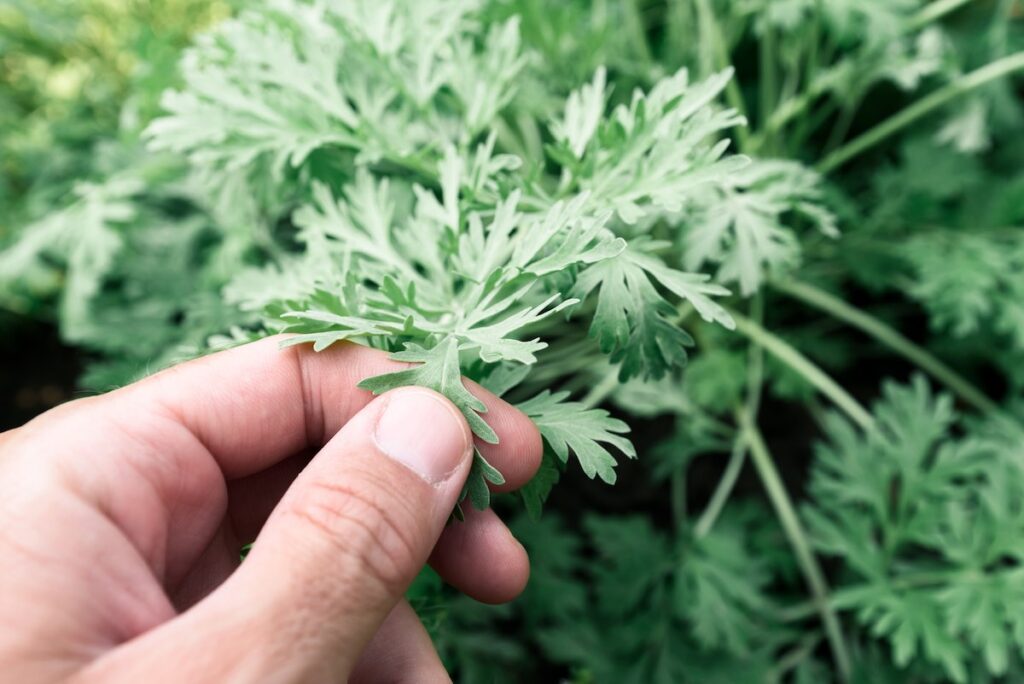
Precautions: Avoid large doses during pregnancy. Concentrated infusions have caused abortion in rats, though weak infusions are considered safe. The essential oil should not be ingested. Small doses can cause kidney failure and even death. Excessive and prolonged use of the herb for years can cause damage to the central nervous system due to high levels of thujone. The use of this plant in folk medicine is widespread, but it must be recognized that wormwood is a strong herb and should be used with caution.
Main properties:
- Anti-amebic: Fights infection caused by Entamoeba histolytica.
- Antibacterial: Used to combat bacteria.
- Antifungal: Destroys or inhibits the growth and reproduction of fungi.
- Antihepatic: Reduces liver inflammation.
- Anti-inflammatory.
- Antipyretic: Reduces fever.
- Choleretic: Stimulates the production of bile in the liver.
- Diaphoretic: Induces sweating.
- Gastric stimulant.
- Immunomodulator.
- Vermifuge: Kills intestinal worms.
Uses and forms of consumption:
- Capsules: 1 to 5 capsules 4 times a day.
Garlic
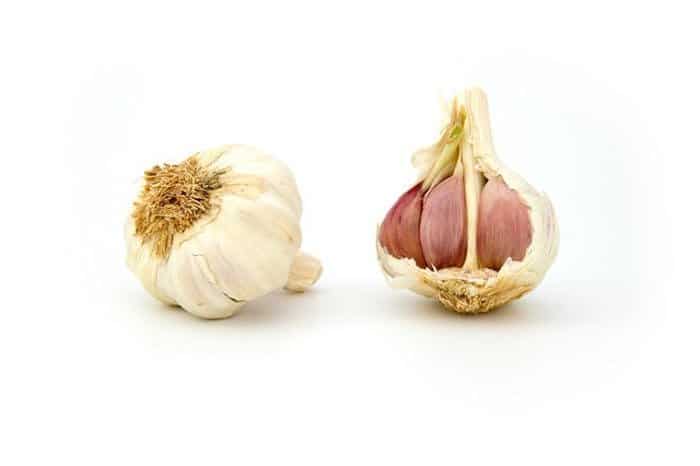
Garlic is considered one of the most effective natural remedies in recent centuries.
It is rich in antioxidants, capable of contributing to the destruction of free radicals, responsible for the deterioration of bodily functions which can lead to heart disease and cancer over time.
Garlic can help lower blood pressure, combat skin infections, and protect the heart.
Precautions: Garlic can cause nausea and vomiting if taken in large quantities. It is not recommended for breastfeeding mothers.
Main properties:
- Antibacterial: Used to combat bacteria.
- Analgesic.
- Antifungal: Destroys or inhibits the growth and reproduction of fungi.
- Antispasmodic: Helps decrease intestinal muscle spasms.
- Antihelmintic: Acts against intestinal parasites.
- Antiparasitic.
- Antiprotozoal.
- Antiseptic: Prevents the growth of pathogenic microorganisms.
- Antiviral: Combats viruses and prevents their reproduction.
- Cholagogue: Induces bile discharge.
- Diaphoretic: Induces sweating.
- Hypotensive: Lowers blood pressure.
- Immune system stimulant.
Uses and forms of consumption:
- Capsules: Take 3 capsules 3 times a day as a preventive measure.
- Tincture: Mix 1/2 fresh bulb in 95% alcohol. Take 40 drops up to 6 times a day.
- Fresh cloves: Eat 1 clove up to 3 times a day as a preventive measure.
Aloe

Main properties:
- Antibacterial: Used to combat bacteria.
- Antimicrobial: Fights microorganisms or prevents their appearance.
- Anti-inflammatory.
- Antiviral: Combats viruses and prevents their reproduction.
- Antiulcerative.
- Healing.
- Purgative.
Uses and forms of consumption:
- External application: Open fresh leaves of the plant and apply to the wound or burn until well covered.
Cryptolepis

Main properties:
- Antibacterial: Used to combat bacteria.
- Antiparasitic.
- Antifungal: Destroys or inhibits the growth and reproduction of fungi.
Uses and forms of consumption:
- Infusion: As a preventive measure, mix one tablespoon of the herb with 6 fl oz of water to make a strong infusion. Take 1 or 2 times a day.
- Capsules: As a preventive measure, take 3 capsules 2 times a day.
- Powder: For external use, grind finely and apply to the site of infection as often as needed.
- Tincture: Mix 1/5 in 60% alcohol. Use 20 to 40 drops up to 4 times a day.
Echinacea

Echinacea has been widely used to strengthen the immune system.
It is considered useful for the prevention and treatment of seasonal diseases such as colds and flu.
Echinacea is particularly convenient in the case of upper respiratory tract diseases, which can include colds and coughs.
It is also indicated for the treatment of infections involving the urinary tract.
Precautions: Echinacea is an immune system stimulant, so prolonged doses should be avoided. In rare cases, it can cause joint pain if taken continuously.
Main properties:
- Antibacterial: Used to combat bacteria.
- Anti-inflammatory.
- Immune system stimulant.
Uses and forms of consumption:
- Wash: Boil 2 oz of flower heads or roots in 1 cup of water for 15 minutes, let steep for 1 hour, and wash venomous bites thoroughly as often as needed.
- Powder: Generously sprinkle the powder on wounds.
- Tincture: Mix dried flower heads in a 1/2 proportion in 95% alcohol. For colds and flu, take no less than 30 drops every hour until symptoms disappear.
- Poultice: Mix the powder with water until it thickens, and apply to the affected area.
Juniper
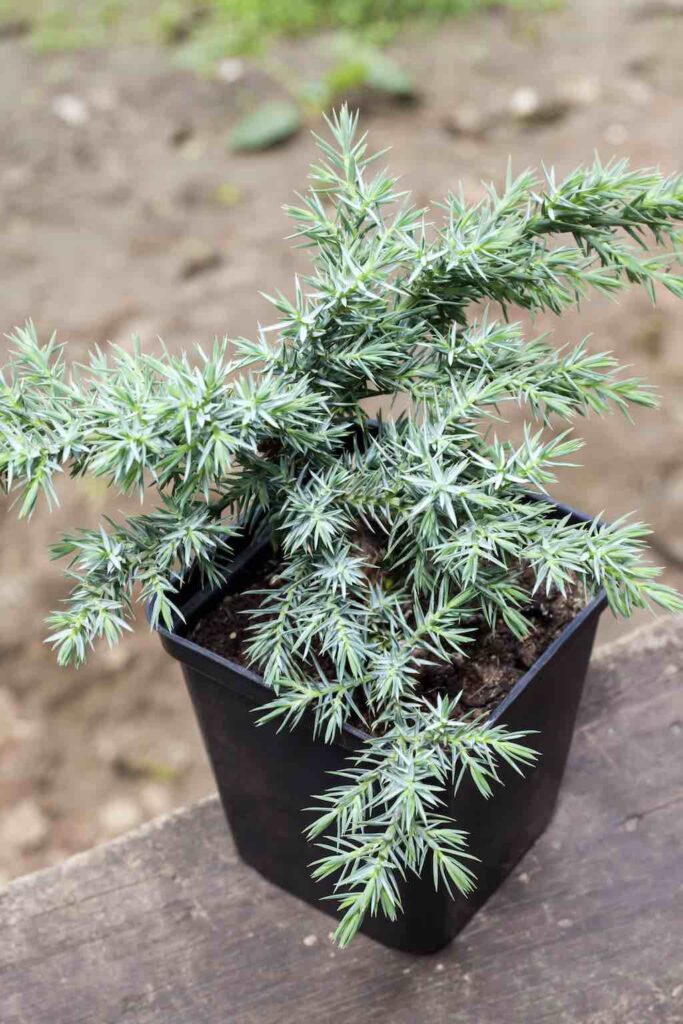
Precautions: Avoid taking it if you have any acute kidney disease, during pregnancy, or with gastric inflammation. High or prolonged doses can irritate the kidneys.
Main properties:
- Antibacterial: Used to combat bacteria.
- Anticatarrhal: Helps fight colds.
- Antifungal: Destroys or inhibits the growth and reproduction of fungi.
- Antimicrobial: Fights microorganisms or prevents their appearance.
- Antiseptic: Prevents the growth of pathogenic microorganisms.
- Carminative: Promotes the expulsion of gases from the digestive tract and reduces flatulence and colic.
Uses and forms of consumption:
- Infusion: Boil one teaspoon of juniper in 6 fl oz of water for 15 minutes. For respiratory tract infections or food poisoning, take as often as desired.
- Wash: To prevent or cure infection, use 1 oz of herb in 1 quart of water, boil for 30 minutes, and let steep overnight.
- Powder: Add powdered plant to prevent or cure wound infection.
- Tincture: Mix the berries in a 1/5 proportion with 75% alcohol. Use 5 to 30 drops up to 3 times a day.
- Steam: Boil 3.5 oz of needles or crushed seeds in 1 gallon of water and inhale the steam.
Eucalyptus
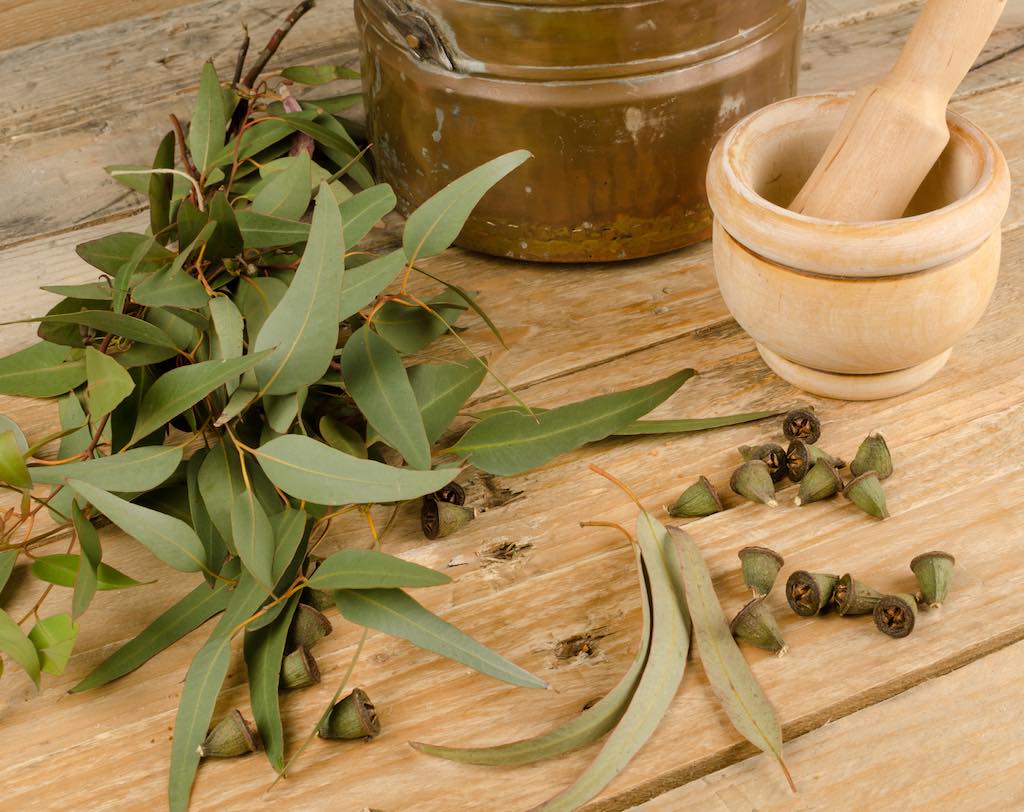
Precautions: Ingesting 4 or 5 drops of eucalyptus essential oil is toxic. The oil can be irritating if placed directly on the skin. Excessive tea consumption can cause intestinal cramps.
Main properties:
- Antibacterial.
- Antifungal: Destroys or inhibits the growth and reproduction of fungi.
- Antipyretic: Reduces fever.
- Antiseptic: Prevents the growth of pathogenic microorganisms.
- Diaphoretic: Induces sweating.
- Mucous secretion stimulant.
Uses and forms of consumption:
- Infusion: Boil 1 oz of herb in 8 fl oz of water, steep for 30 minutes. Take up to 6 times a day for colds, sore throat, bronchial congestion, fever, or chills.
- Wash: Wash infected wounds with an infusion of 1 oz of herb in 8 fl oz of water, steep for 30 minutes.
- Powder: Apply powder to infected skin, wounds, ulcers as needed.
- Tincture: Mix 1/2 fresh herb in a 95% alcohol proportion.
- Gargle: 30 drops of tincture in 6 fl oz of water. Gargle up to 3 times a day and swallow.
- Nasal spray: 30 drops of tincture in 1 fl oz of water as desired.
- Douche: 0.25 fl oz of tincture in 1 pint of water once a day.
- Steam: Boil 3 to 4 oz of herb in 1 gallon of water, remove from heat, and inhale the steam.
Grapefruit Seed

Precautions: Grapefruit seed extract must be diluted before use. Prolonged use can kill all intestinal bacteria just like broad-spectrum antibiotics. The diluted extract can cause skin and mucous membrane irritation. Keep out of reach of children. Caution is advised during pregnancy.
Main properties:
- Antibacterial.
- Antifungal: Destroys or inhibits the growth and reproduction of fungi.
- Antimicrobial: Fights microorganisms or prevents their appearance.
- Antiparasitic: Eliminates or prevents parasites.
- Antiseptic: Prevents the growth of pathogenic microorganisms.
- Antiviral: Combats viruses and prevents their reproduction.
Uses and forms of consumption:
- Wash: 2 to 40 drops in 16 fl oz of water for infected wounds.
- Disinfectant: 30 to 40 drops per quart of water.
- For bandages: 30 to 40 drops in 1 quart of distilled water in a spray bottle.
- Nasal spray: 3 to 5 drops up to 6 times a day.
- Douche: 6 to 12 drops in 16 fl oz of water, twice a day for up to 1 week.
- To purify water: 3 drops per 8 fl oz of water.
Ginger
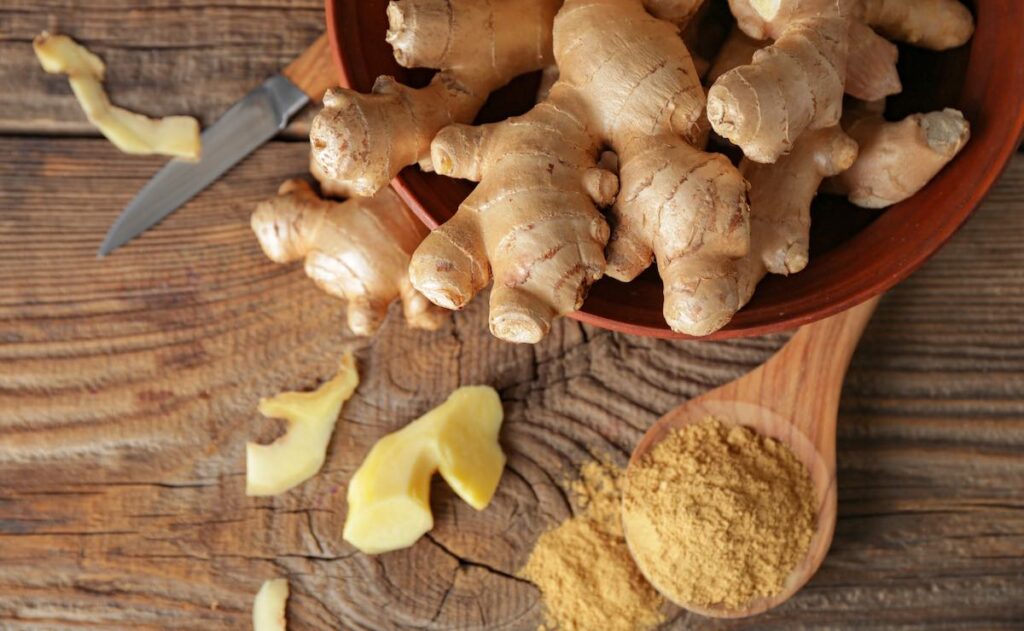
Ginger is a true health panacea. It can be eaten fresh, as a food itself, or as a spice and condiment after being dried and ground into powder. The beneficial effect of ginger provides with the infusion is very useful for the treatment and prevention of flu, sore throat, cough, and colds.
Precautions: Avoid large doses during pregnancy.
Main properties:
- Analgesic.
- Antiarthritic.
- Antibacterial.
- Anticoagulant.
- Antitussive.
- Antispasmodic: Helps decrease intestinal muscle spasms.
- Antifungal: Destroys or inhibits the growth and reproduction of fungi.
- Anti-inflammatory.
- Antiviral: Combats viruses and prevents their reproduction.
- Carminative: Promotes the expulsion of gases from the digestive tract and reduces flatulence and colic.
- Diaphoretic: Induces sweating.
- Circulatory stimulant.
- Hypotensive: Lowers blood pressure.
Uses and forms of consumption:
- Infusion: Boil 1 oz of fresh root for 5 minutes in 8 fl oz of water.
- Capsule: Grind the herb into powder and encapsulate. Take 3 capsules 3 times a day.
- Tincture: Mix fresh root in a 1/2 proportion in 95% alcohol. Use 10 to 20 drops up to 4 times a day.
- Root: Eat the desired amount often.
Honey

Precautions: There are three cases in which honey can be harmful: if bees make honey from poisonous plants, occasionally raw honey can contain botulism spores which can be very dangerous for children under 1 year old, and in rare cases, people allergic to bee stings can have adverse reactions to honey.
Main properties:
- Antianemic: Helps restore normal hemoglobin production and the formation of red blood cells.
- Antifungal: Destroys or inhibits the growth and reproduction of fungi.
- Anti-inflammatory.
- Antiviral: Combats viruses and prevents their reproduction.
- Immune system stimulant.
- Expectorant: Expels phlegm and secretions from the pharynx, larynx, trachea, or bronchi.
- Laxative: Helps facilitate bowel movements.
- Tonic: Reconstitutes.
Uses and forms of consumption:
- Dilute in infusion: As a preventive measure, take one tablespoon in the infusion three times a day.
- External application for ulcers, wounds, burns, and infectious skin inflammation: Apply directly without diluting, cover with a sterile bandage, and change daily.
- Undiluted: As a preventive measure, take one tablespoon 3 times a day.
Goldenseal Root

Precautions: Do not use during pregnancy. Some clinical cases report abdominal cramps, nervous tremors, and excessive dryness of mucous membranes when high doses are used.
Main properties:
- Anti-amebic: Fights infection caused by Entamoeba histolytica.
- Antibacterial: Used to combat bacteria.
- Antifungal: Destroys or inhibits the growth and reproduction of fungi.
- Antihemorrhagic: Promotes blood clotting.
- Anti-inflammatory mucous.
- Astringent: Prevents and helps eliminate gases from the digestive tract, relieving colic and spasms.
- Diaphoretic: Induces sweating.
- Expectorant: Expels phlegm and secretions from the pharynx, larynx, trachea, or bronchi.
- Mucous secretion stimulant.
- Antiseptic: Prevents the growth of pathogenic microorganisms.
Uses and forms of consumption:
- Infusion: For viral or bacterial eye infections, use an infusion of powdered root. 1 teaspoon in 6 fl oz of hot water, steep for 1 hour, and use as eye drops.
- Powder: Apply to any cut or infected wound.
- Tincture: Mix fresh herb in a 1/2 proportion in 90% alcohol, 15-30 drops up to 4 times a day. Or dried root in a 1/5 proportion in 70% alcohol, 20-50 drops up to 4 times a day.
- Douche: 1 teaspoon (0.17 fl oz) of powdered root infusion in 16 fl oz of water. Use each morning and each evening until symptoms decrease.
Licorice
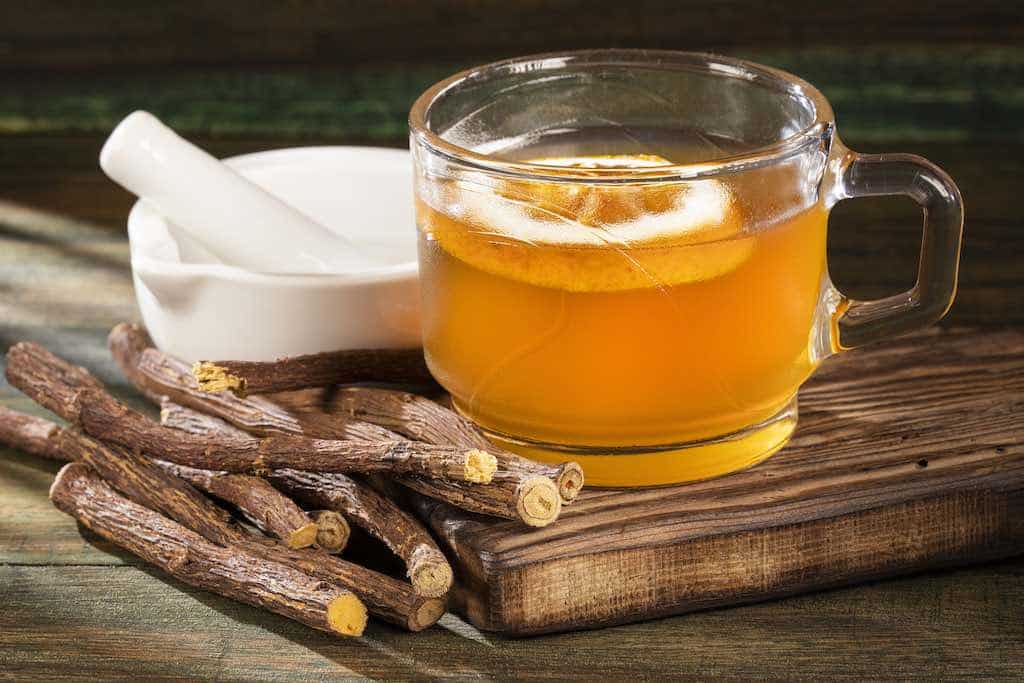
Precautions: Licorice has many side effects. Overdose or prolonged use can cause severe potassium depletion, hypertension, decreased plasma renin and aldosterone, edema, and in very large doses, reduction in the size and weight of the thymus and the number of blood cells. All these contraindications tend to decrease 2-4 weeks after stopping licorice intake. It is contraindicated during pregnancy and in people with corticosteroid therapy. The citations that record these side effects are generally for licorice candy and extracts.
Main properties:
- Antidiuretic: Reduces urine excretion.
- Antispasmodic: Helps decrease intestinal muscle spasms.
- Antihyperglycemic: Reduces excessive glucose in the blood.
- Antihepatotoxic: Acts against hepatotoxicity.
- Anti-inflammatory: Combats inflammation.
- Antiulcerative: Blocks the secretion of hydrochloric acid and facilitates the repair of gastric and duodenal ulcers.
- Antioxidant: Prevents oxidation.
- Demulcent: Helps and protects irritated or inflamed tissues.
- Gastric stimulant: Stimulates the gastric system.
- Pancreatic secretion stimulant: Stimulates pancreatic secretions.
- Immune system stimulant.
- Expectorant: Expels phlegm and secretions from the pharynx, larynx, trachea, or bronchi.
- Free radical inhibitor.
- Immunomodulator: Modifies one or more functions of the immune system.
- Laxative: Helps facilitate bowel movements.
Uses and forms of consumption:
- Infusion: 1/2 to 1 teaspoon of powdered root in 8 fl oz of water. Simmer for 15 minutes. Take up to 3 cups a day.
- Capsules: 2 to 8 capsules a day.
- Tincture: Mix dried root in a 1/5 proportion in 50% alcohol. Take 30 to 60 drops up to 3 times a day.
Sage
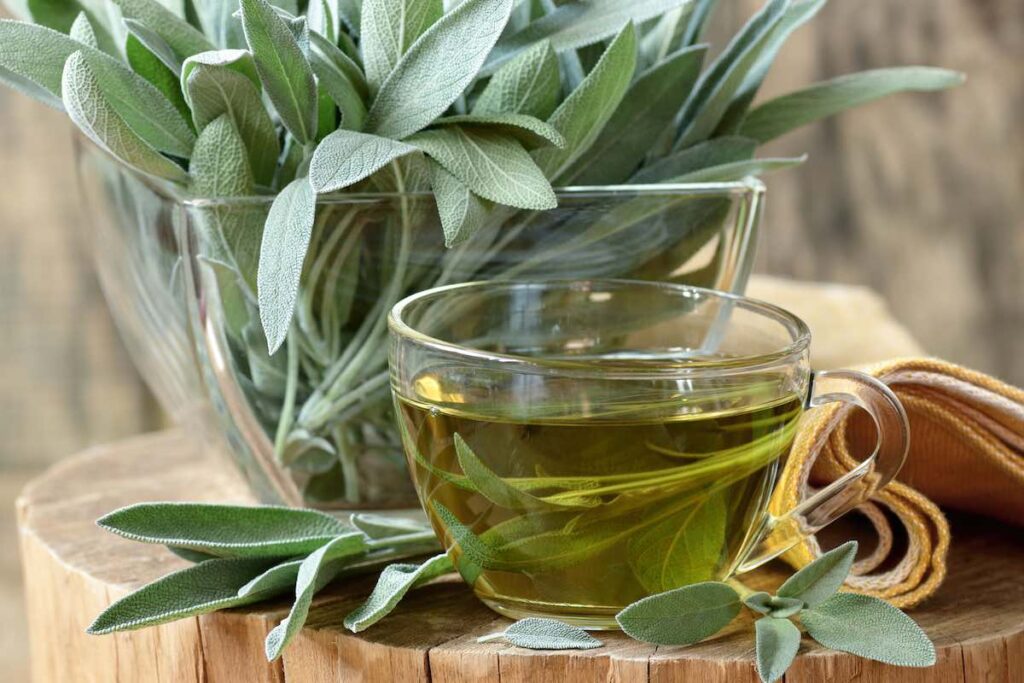
Precautions: Not recommended during pregnancy or lactation.
Main properties:
- Antibacterial: Used to combat bacteria.
- Antiseptic: Prevents the growth of pathogenic microorganisms.
- Astringent: Prevents and helps eliminate gases from the digestive tract, relieving colic and spasms.
- Diaphoretic: Induces sweating.
- Expectorant: Expels phlegm and secretions from the pharynx, larynx, trachea, or bronchi.
Uses and forms of consumption:
- Infusion: 2 teaspoons of leaves in 8 fl oz of water, steep for 15 minutes. Gargle and then swallow for throat infections and fever 3 to 6 times a day. For tonic use, let 4 oz steep in a quart of water overnight and drink cold throughout the next day for 7 days.
- Powder: Sprinkle on infected wounds.
- Tincture: Mix fresh herb in a 1/2 proportion with 95% alcohol. Or dried herb in a 1/5 proportion in 50% alcohol. Preventive use: 10 to 30 drops up to 3 times a day. In acute conditions, 30 to 60 drops up to 6 times a day.
- Essential oil: In a diffuser or drops in 1 fl oz nasal spray. Its use in a diffuser helps prevent and cure infection.
- Steam: Mix 4 oz of herb in 1 gallon of water, bring to a boil and inhale the steam.
Usnea
Precautions: Usnea tincture is often irritating to the mucous membranes of the mouth and throat. It should be diluted in a glass of water before consumption. Animal studies have shown that excessively high amounts of usnic acid are toxic to animals, although no toxicity has been observed in human use. Generally, the amount of usnea ingested does not contain sufficient amounts of heavy metals to harm the body. However, it is recommended to harvest usnea at least 100 meters from roads, factories, and polluted areas.
Main properties:
- Antibacterial: Used to combat bacteria.
- Antifungal: Destroys or inhibits the growth and reproduction of fungi.
- Immune system stimulant: Stimulates the immune system.
Uses and forms of consumption:
- Powder: Sprinkle on the site of infection. Except for impetigo (staphylococcal skin infection): use the tincture directly or dilute 50% and apply directly to the site of infection with a cotton swab.




















